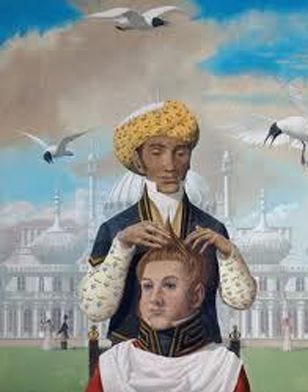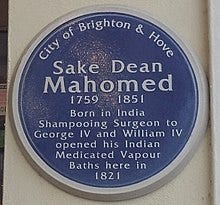Mohamed’s Bath on Brighton roads in 1800's.
Sake Dean Mahomed (1759–1851), pronounced Sheikh deen mohammed was an Bengali traveller, surgeon, entrepreneur, and one of the most notable early non-European immigrants to the Western World. He has unparalled place in Indian English literature history, he was the first Indian author to publish in English language, “ The Travels of Dean Mahomed”, in 1794.
“Mahomed’s Baths” served on Brighton seafront and served elite class Englishmen who came to get head massage and steam baths. This technique was nicknamed as “shampooing” which was inspired by a Hindi word “champi”, which is well known in every Indian household, meaning “a head massage”. In the bathhouse, he advertised as ‘the Indian Medicated Vapour Bath’ (it had Indian medicinal herbs added to the vapour) and ‘Shampooing with Indian Oils’. It became the part of royal lifestyle of England. His clientele included famous names from Prince of Wales to George IV and later Willian IV. He was known as the ‘The Shampooing Surgeon of Brighton’. In 1822, King George IV appointed Mahomed as his personal ‘shampooing surgeon’. A portrait of Mahomed hangs in the Brighton Museum, commemorating this man who had merged two homeland cultures British and India.
Dean Mahomed in 1759 into a family claiming traditions of service to the Mughal Empire. After the death of his father, at the age of eleven, he joined the East India Company’s Bengal Army as a camp follower, and attached himself to an Ensign Godfrey Evan Baker. Over the next fifteen years, they travelled all over the Gangetic plain, from Delhi to Dhaka. When Baker sailed home to Cork in 1784, Dean Mohamed went to Ireland with him. He settled down there, and married an Anglo-Irish girl Jane Daly. The Travels of Dean Mahomet, could be influenced by his extensive reading of the works of Addison’s and Smollett’s account of their travels. “The travel of Dean Mahomed” is an epistolary, which was in vogue at the time for travel books and novels. Its a thirty-eight letter memoir.
After his death in 1851, Sake Dean Mahomed, had begun to lose prominence as a public figure and until the recent scholarly interventions. The modern renewal of interest in his writings developed after poet and scholar Alamgir Hashmi drew attention to this author in the 1970s and 1980s. Michael H. Fisher has written a book on Sheikh Dean Mahomet entitled The First Indian Author in English: Dean Mahomed in India, Ireland, and England (Oxford University Press, Delhi, 1996). Additionally, Rozina Visram’s Ayahs, Lascars and Princes: The Story of Indians in Britain 1700–1947 (1998) was highly influential in drawing public attention to Mahomed’s life and work.
Several commemorations of and tributes to Mahomed’s legacy have taken place in the 21st century. On 29 September 2005 the City of Westminster unveiled a Green Plaque commemorating the opening of the ‘Hindoostane Coffee House’. The plaque is at 102 George Street, close to the original site of the coffee house at 34 George Street. On 15 January 2019, Google recognised Sake Dean Mahomed with a Google Doodle on the main page.
References:
English Literature notes, IGNOU, India.



.jpg)




Comments
Post a Comment